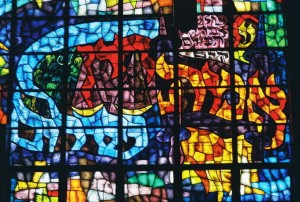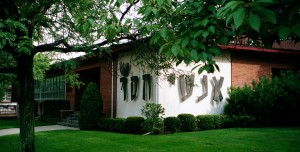Posts Tagged ‘Leadership’
The Larger the Community…the Less Friendly?
Why are smaller Jewish communities friendlier? The easy answer is, “It’s because everyone knows each other. And whoever lives there is all they’ve got.” Ok, I live in a small community. I get that.
But here’s the bigger question in my mind:
What happens to a community as it grows that makes people unfriendly?
Do people just wake up one day and say, “You know, there are waaay too many people in this community. Maybe if I stop being friendly, they’ll all go away!”
Ok, probably not.
But something is happening there that I can’t explain. When the community was small, a new family was welcomed warmly with friendly introductions, welcome gifts, and Shabbat meal invitations. But now that the community is larger, people can’t do that anymore…?
Maybe you can argue that the community is so large, it’s hard to reach everyone who just moved in. It becomes impossible to keep track of all the newcomers. And you don’t want to leave anybody out. So since you can’t invite all of them for meals, you just invite none of them.
Yeah that makes sense.
Ok, no it doesn’t.
Why can’t people in larger communities just welcome whoever they see is new?
Everyone should get a welcome from someone.
So here is where you say, “In larger communities, nobody knows who’s new and who’s not!” This makes sense for about half a second. Ok, that’s enough, that was more than half a second. Read it again and now let’s think this through. You see someone at Kiddush that you’ve never seen before. There are four possibilities:
- They are new in the community.
- They are not new, you just never met them before.
- They have lived here for a while but are newly observant.
- They are visiting the community for shabbos.
Not one of these possibilities precludes you from being friendly to them. In all four situations, there is absolutely no reason not to say “Good Shabbos” and no reason not to start a friendly conversation with them.
How about something like this: “Sorry, I don’t think we’ve met before. Do you live here….? Are you visiting…? Have you met our rabbi yet…?”
It’s really not complicated. Really, it isn’t.
I was once in a different community for shabbos. The only person who said one word to me at Kiddush was a paid employee of the shul: the rabbi. While I was glad of that, I wondered why nobody else in a shul of 200+ people thought to be friendly. When I told my host later, she said, “Really? That shul is known to be the friendliest one in town!”
Maybe. But only friendly to people they know.
You must admit, it’s a very odd phenomenon.
In very large communities, I’m sure there are women who look across the street, see someone they don’t know, and think to themselves: “Hm, she doesn’t know me, why should she want to talk to me? Besides, her outfit is much more stylish than mine. I can’t even compete. Uch, I won’t even bother. Besides, I have my friends.”
And maybe there are women who say the opposite. “Uch, look at her imitation boots, and how her sheitel is so flat on top. She’s so not cool. I wouldn’t want to be friends with someone like that.”
Whatever it is that stops people from being friendly in a larger community makes absolutely no sense. It simply boggles the mind.
I love my friendly community. We practically bombard newcomers with questions. “Where are you staying? Where are you from? Do you know the so-and-so’s? How do you like the shul so far? Who else did you meet? Where are you eating lunch? Etc., etc.”
No matter how big our community grows, when you come for a shabbos, I intend to welcome you that very same way.
Come for a shabbos! We love visitors! Congregation Anshe Chesed in Linden, NJ
Does size matter? How friendly is your community?
Why I Wish I Lived in Newark!
The most revered ancient leaders carried scepters. This leader carries a snow shovel.
Enter Cory Booker, mayor of Newark, NJ and the hero of Blizzard 2010.
I admit, I read every one of Cory Booker’s tweets during this storm cleanup, and I am truly amazed at his leadership and personal effectiveness. Not only was he out there, literally, in the trenches, but he used twitter to cut out the bureaucracy of government. Government became accessible, and actually helpful.
 Cory’s tweets did three things that Newark needed desperately:
Cory’s tweets did three things that Newark needed desperately:
- Immediate Response to Crisis – People tweeted for help, and Cory Booker responded. Someone said they can’t get out and they need diapers. An hour later, he showed up at their doorstep with diapers. Each night, Cory Booker was up until the wee hours of the morning, helping dig out people’s cars, emergency vehicles, NJ Transit buses, whoever was stuck. He also spent a lot of time on his cell phone, talking to Newark residents, and sending over help. This kind of leadership today is very rare.
- Encouragement – Cory Booker wrote things like, “Extraordinary challenges call for extraordinary effort, its the only way to get extraordinary results. Please help someone out today.” Wherever he went, he encouraged volunteers, and this was incredible. People really came out and helped pure strangers dig out of the snow. I don’t even live in Newark, but I feel the sense of unity he created.
- Appreciation – Cory Booker didn’t forget to give credit where credit was due. He tweeted things like, “So grateful for the hard work of police officer who has been with me much of last 2 days. He is a superstar. Go Det. John Olivera” and “Here in the South Ward – grateful for residents on Aldine coming out past midnight to help. We have great ppl in Brick City.”
This was truly amazing leadership.
NYC got a lot of negative press for the time it took sanitation crews to get to all its streets. But as Cory Booker points out, in a tweet, “People far 2 rough on @mikebloomberg – still fighting 2 clear snow in NWK & we are 1/29th size of NYC.”
So Newark wasn’t plowed any faster, but the fact that Cory Booker was on the streets shoveling, calling people, and tweeting to the public made all the difference in the world.
Bloomberg came out of this storm at first defensive, and then threw his own crews “under the bus” (pun intended), saying, “We did not do as good a job as we wanted to do, or as the city has the right to expect.” Bloomberg, however, said the time to grill sanitation bosses on what went wrong is not at hand – that comes once all the streets are cleared.
But Cory Booker came out a hero.
From beginning to end, he was there, he was responsive, and he made people feel taken care of. Just shows you what real leadership and twitter can do.
What did you think about Cory Booker’s tweets?